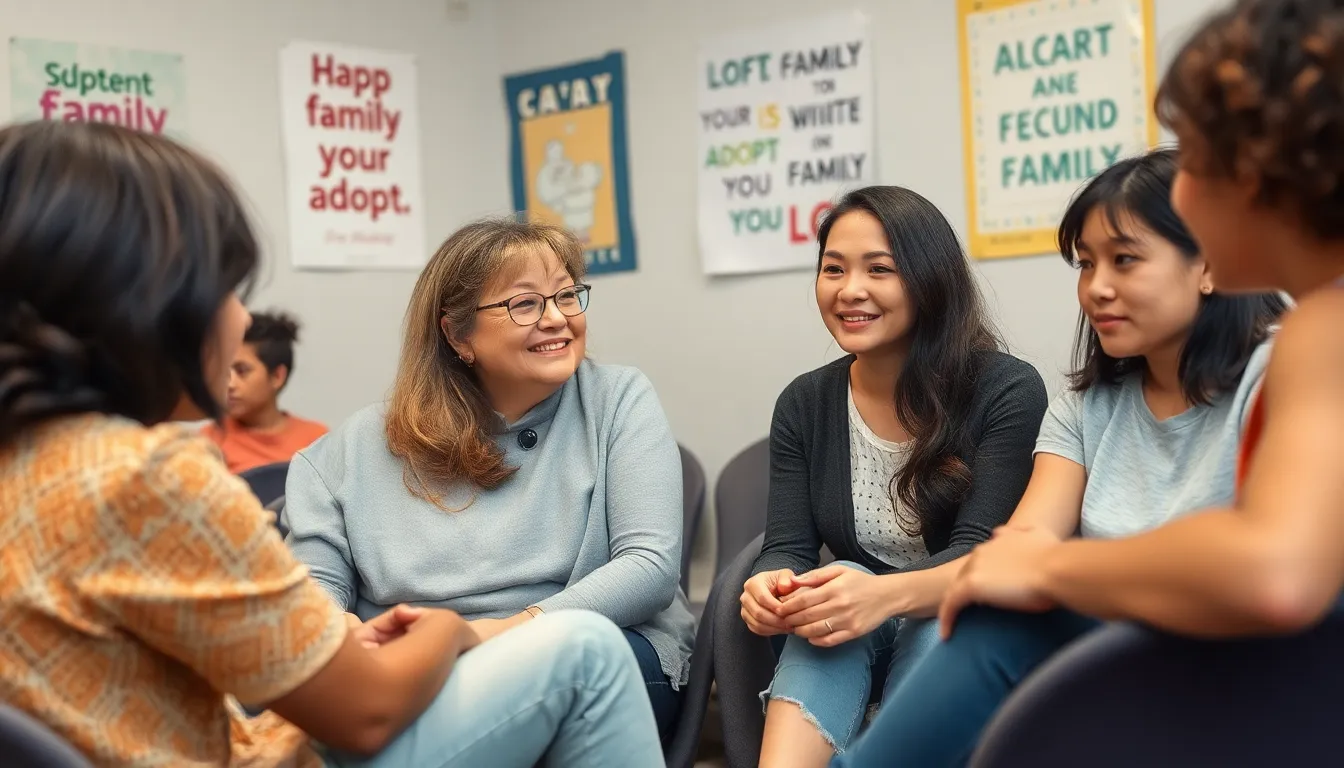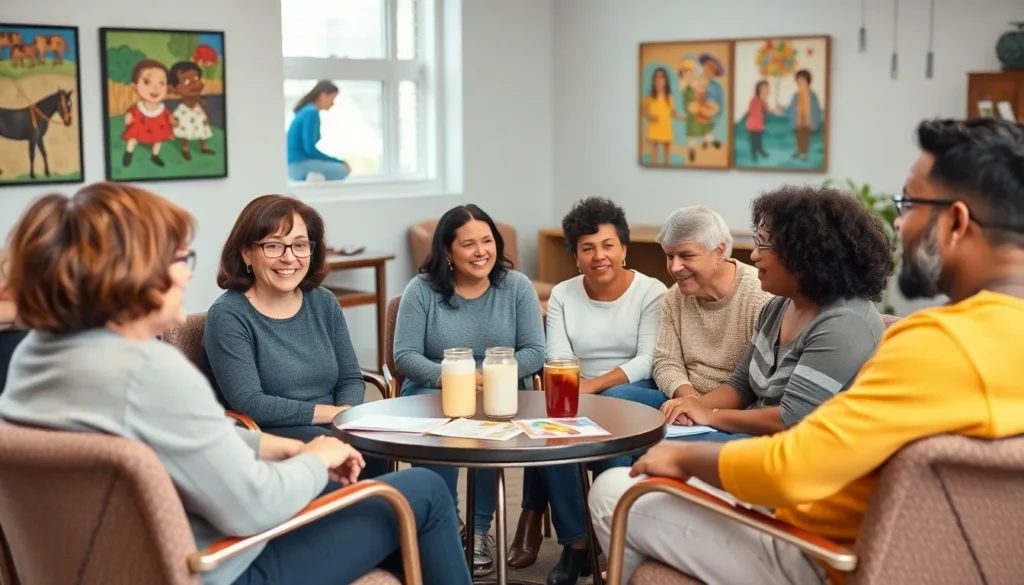Table of Contents
ToggleNavigating the world of adoption can feel like trying to assemble IKEA furniture without the instructions—confusing and a little overwhelming. That’s where adoption support groups come in, offering a lifeline for those embarking on this heartfelt journey. These groups provide a safe space for sharing experiences, advice, and maybe even a few laughs over the chaos that comes with parenting.
Imagine a room filled with people who get it—parents who’ve faced the same sleepless nights, the same questions, and the same joy that comes from building a family. Adoption support groups aren’t just about support; they’re a community where friendships blossom and stories unfold. Whether you’re a seasoned pro or just starting out, these groups can turn the daunting into the doable, making the journey of adoption a little brighter and a lot more fun.
Overview of Adoption Support Groups
Adoption support groups serve as vital resources for individuals navigating the complexities of adoption. These groups foster understanding and connection among parents facing similar experiences.
Definition of Adoption Support Groups
Adoption support groups consist of gatherings where individuals share insights and concerns related to the adoption journey. They include various formats, including in-person meetings, online forums, and social media communities. Members typically consist of adoptive parents, birth parents, and adoptees, creating diverse perspectives that enrich discussions. These groups aim to provide emotional support, practical guidance, and a sense of belonging and solidarity.
Importance of Adoption Support Groups
Adoption support groups play a crucial role in reducing feelings of isolation during the adoption process. They offer a space for individuals to voice challenges, celebrate milestones, and exchange information. A sense of community often develops, enhancing emotional well-being and resilience among members. Educational resources, such as workshops and guest speakers, enrich group activities, ensuring families feel informed and empowered. Relationships built within these groups often lead to lasting friendships, providing a robust support network that extends beyond initial adoption challenges.
Types of Adoption Support Groups

Adoption support groups come in various forms, catering to different needs within the adoption community. The major types include peer support groups and professional support groups.
Peer Support Groups
Peer support groups provide a platform for individuals with shared experiences in adoption. These groups often consist of adoptive parents, birth parents, and adoptees who connect on a personal level. Members share stories, advice, and support, fostering understanding among participants. Many choose in-person meetings, while others utilize online forums for accessibility. Group dynamics often create a safe space where individuals can express their feelings, celebrate victories, and discuss challenges without judgment. Regular meetings and activities enhance community bonds and lead to friendships that often extend beyond adoption.
Professional Support Groups
Professional support groups offer structured guidance from trained facilitators and experts in adoption. These groups frequently include therapists, social workers, and educators who provide invaluable resources and educational materials. Participants benefit from workshops and discussions focusing on relevant topics such as trauma, attachment, and parenting strategies. Professional support often reassures members, offering evidence-based practices to navigate their adoption journeys. While these groups may operate in various settings, they prioritize fostering a sense of community and enhancing personal growth through informed dialogue.
Benefits of Joining Adoption Support Groups
Joining adoption support groups offers several valuable advantages for families navigating the adoption process.
Emotional Support
Emotional support stands as a primary benefit of adoption support groups. Members often share personal stories, allowing them to connect on a deeper level. Each participant has the opportunity to express feelings, whether those are related to joy, heartbreak, or uncertainty. Experiences are validated in these spaces, leading to an atmosphere of understanding and empathy. Feeling understood reduces isolation and fosters resilience during challenging times. Sharing celebrations, such as adoption finalizations or birthdays, reinforces bonds and creates a nurturing environment.
Resources and Information
Access to resources and information empowers individuals in adoption support groups. Workshops and seminars frequently cover relevant topics, enriching members’ knowledge. Members can gain insights from expert speakers, including therapists and social workers. New families often learn about legal processes, parenting strategies, and trauma-informed care. Furthermore, group members exchange tips and experiences, leading to practical advice. Staying informed enables families to navigate adoption experiences with greater confidence, preparing them for various scenarios.
Community Building
Community building within adoption support groups fosters lasting relationships. Connections formed among participants often lead to friendships that extend beyond meetings. Members celebrate milestones together, whether through social events, family outings, or online gatherings. They create a supportive network that remains available long after initial challenges. Engaging with others who share similar experiences enhances a sense of belonging and shared purpose. Furthermore, sharing resources and referrals strengthens the community, allowing individuals to feel supported throughout their adoption journey.
How to Find Adoption Support Groups
Finding adoption support groups requires exploring multiple resources. Individuals can start by looking within their local communities.
Local Resources
Community centers and family services often organize adoption support groups. Local adoption agencies also host workshops and support meetings. Churches and faith-based organizations may provide additional resources and gatherings. Neighborhood bulletin boards and local newspapers frequently list upcoming events. Parents can connect with other adoptive families through schools or parenting groups. Engaging in local events allows individuals to meet others who share similar experiences.
Online Platforms
Online platforms offer extensive options for connecting with adoption support groups. Websites such as Facebook and Meetup host numerous groups focused on adoption. Forums like Adoption.com provide safe spaces for discussion and advice. Resource centers often maintain lists of virtual support options and websites dedicated to adoption issues. Video conferencing tools like Zoom allow for interactive group meetings, ensuring accessibility for all. Engaging virtually enables participants to connect with a broader network of individuals on similar journeys.
Adoption support groups play a crucial role in the lives of those navigating the complexities of adoption. They create a nurturing environment where individuals can share their experiences and find comfort in knowing they’re not alone. The friendships formed within these groups often provide a lasting foundation of support that extends beyond the adoption process.
By accessing valuable resources and connecting with others who understand their journey, members can foster personal growth and resilience. Whether through in-person meetings or online communities, these groups empower individuals to embrace the joys and challenges of adoption with confidence. Ultimately, the sense of community cultivated within these support networks enriches the adoption experience, making it more fulfilling and less isolating.





